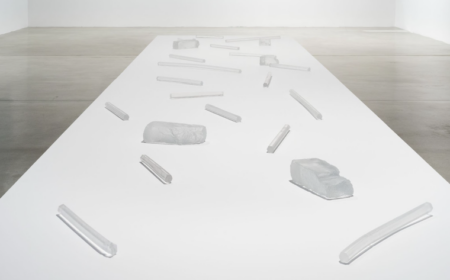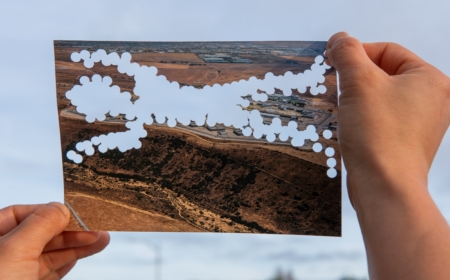Hank Willis Thomas (based in New York City) is a conceptual artist working primarily with themes related to perspective, identity, commodity, media, and popular culture. His work often incorporates widely-recognizable icons—many from well-known advertising or branding campaigns—to explore their ability to reinforce generalizations developed around race, gender and ethnicity. Thomas created one of his most icon—many from well-known advertising or branding campaigns—to explore their ability to reinforce generalizations developed around race, gender, and ethnicity. Thomas created one of his most iconic photography series in 2006, Branded, where he superimposed bodies of Black men with the Nike swoosh logo, recalling the history of branding slaves in the U.S. as well as the literal and figural objectification of Black male bodies in contemporary culture. Influenced by social history and the hard-fought, perennial battle for equality in all areas of his work, Thomas co-founded For Freedoms with artist Eric Gottesman in 2016 as a platform for creative civic engagement in America. Inspired by American artist Norman Rockwell’s paintings of Franklin D. Roosevelt’s Four Freedoms (1941): freedom of speech, freedom of worship, freedom from want, and freedom from fear/ For Freedoms uses art to encourage and deepen public explorations of freedom in the 21st century.
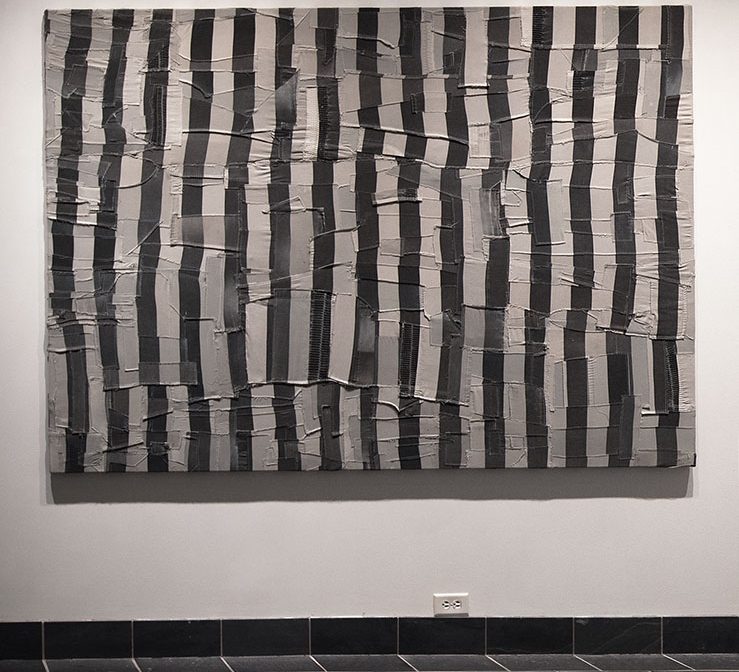
2017
Bars
Courtesy of the artist and Jack Shainman Gallery, New York
Quilt made of decommissioned prison uniforms
Hank Willis Thomas’s conceptual art practice often questions visual systems and the connections between images and meanings, especially in relation to social and political inequalities. Bars is a quilt made of decommissioned black-and-white striped prison uniforms. Striped uniforms, with their reference to the bars of a prison cell, were prevalent in the early 19th century.
The uniforms visually marked wearers as criminals, drawing a neat line between the supposedly guilty and the innocent in society, while also stigmatizing prisoners. Though this striped design is no longer in use, the quilt is a reminder that this history has been stitched into our visual landscape and cultural imagining of criminality.
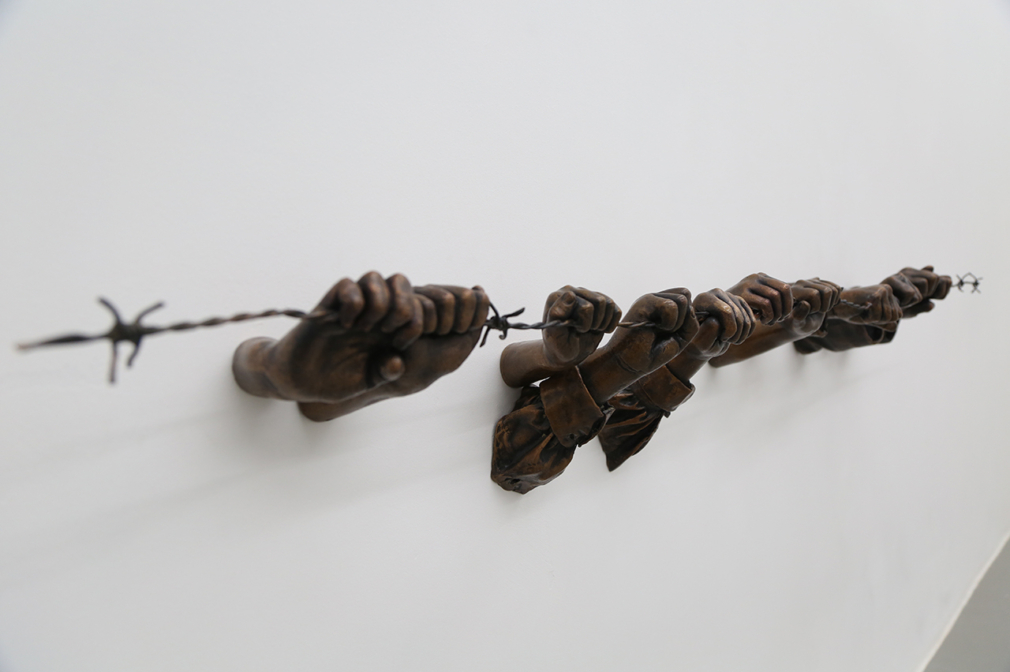
2014
If the Leader Only Knew
Nasher Museum of Art at Duke University. Promised gift of Marjorie and Michael Levine
Bronze, from the “Punctum” series
If the Leader Only Knew is part of Hank Willis Thomas’s “Punctum” series of works, made from imagery found in twentieth-century German publications and archives. This sculpture depicts small, child-sized hands grasping onto a barbed wire. Sourced from a photograph of prisoners in a Nazi concentration camp, but removed from that historical context and cast in bronze, the hands evoke the history of the Holocaust as well as other racialized histories of internment and concentration camps, including the rampant incarceration of people of color in the United States.
Black men are six times and Hispanic men are 2.7 times as likely to be imprisoned as white men; Native Americans constitute the largest incarcerated population per capita; Black women the fastest growing incarcerated population; and one out of every two Black transgender individuals are jailed at some point in their lives. Thomas’s powerful bronze sculpture casts the current state apparatuses of prisons, jails, and detention centers within a wider history of racism and dehumanization.
Hank Willis Thomas’s work is also featured in the following Barring Freedom study guides: Introduction, From the Inside Out, Abolition Futures
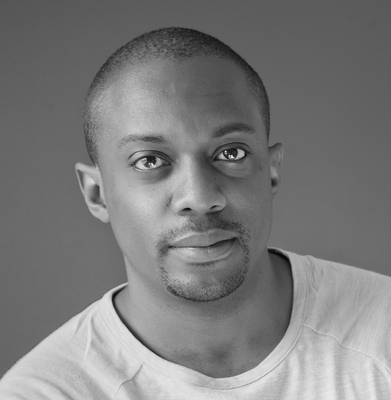
Hank Willis Thomas’s work has been exhibited throughout the United States and abroad including the International Center of Photography, New York; Guggenheim Museum Bilbao, Spain; Musée du quai Branly, Paris; Hong Kong Arts Centre, Hong Kong, and Witte de With Center for Contemporary Art, Netherlands. Solo exhibitions of his work have been featured at Portland Art Museum, Portland, OR; Crystal Bridges Museum of Art, Bentonville, AK; Savannah College of Art and Design Museum of Art, Savannah, GA; California African American Museum, Los Angeles, CA; Philadelphia Photo Arts Center, Philadelphia, PA; Cleveland Museum of Art, Cleveland, OH; the Art Museum at the University of Kentucky, Lexington, KY; The Aldrich Contemporary Art Museum, Ridgefield, CT; Corcoran Gallery of Art, Washington, D.C.; Brooklyn Museum, Brooklyn, NY; Baltimore Museum of Art, Baltimore, MD; Nerman Museum of Contemporary Art, Kansas City, MO, and the African American Museum, Philadelphia, PA, among others. His collaborative projects include Question Bridge: Black Males, In Search Of The Truth (The Truth Booth), The Writing on the Wall, and For Freedoms. In 2017, For Freedoms was awarded the International Center of Photography Infinity Award for New Media and Online Platform. Thomas is a recipient of the Gordon Parks Foundation Fellowship; The Guggenheim Fellowship; Aimia AGO Photography Prize; Soros Equality Fellowship; Aperture West Book Prize; Renew Media Arts Fellowship from the Rockefeller Foundation, and the New York Foundation for the Arts Fellowship Award. He is also a member of the Public Design Commission for the City of New York.
Learn More
Suggested Reading
Anzaldúa, Gloria
Borderlands = La Frontera: The New Mestiza
First edition. San Francisco: Spinsters/Aunt Lute, 1987.
Browne, Simone
Dark Matters: On the Surveillance of Blackness
Durham: Duke University Press, 2015
Davis, Angela Y.
Are Prisons Obsolete?
New York: Seven Stories, 2003.
Freire, Paulo
Pedagogy of the Oppressed
30th anniversary ed. New York: Continuum, 2000.
Lorde, Audre
Sister Outsider: Essays and Speeches
Crossing Press, 2007.

